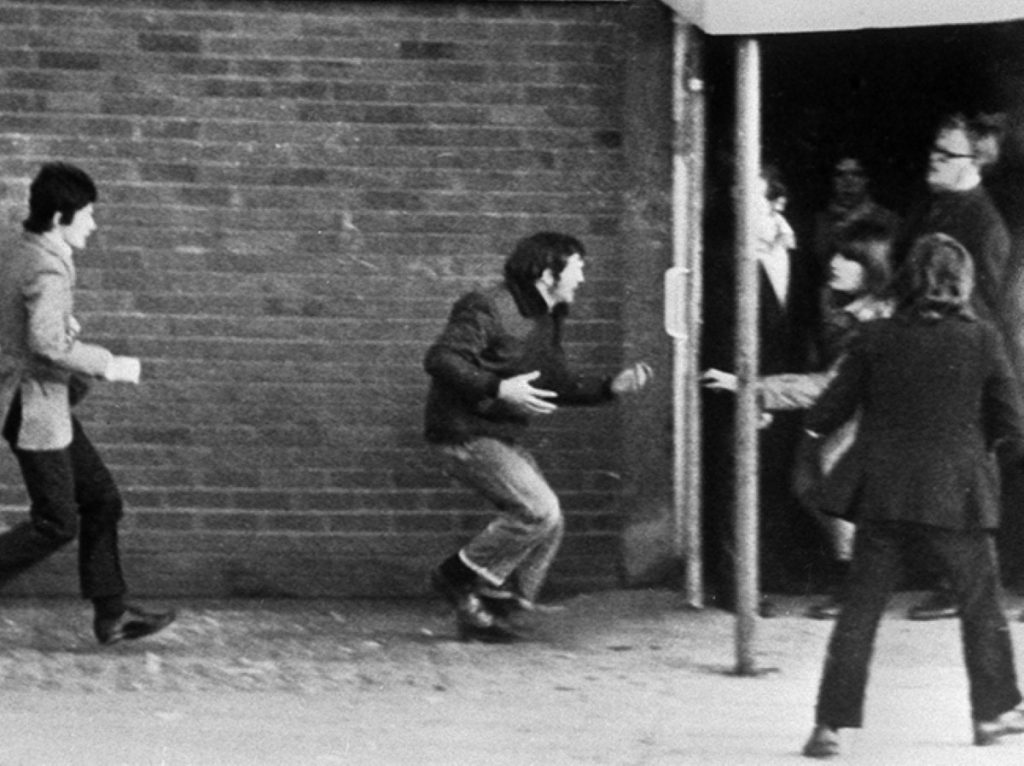Bloody Sunday: The British government apologises
By Ian Dunt and Alex Stevenson
David Cameron has apologised on behalf of the British government for the events of Bloody Sunday, after the long-awaited report into the killings was finally published.
The prime minister delivered a sombre statement to the Commons outlining the report’s findings, which was watched by thousands in Londonderry’s Guildhall area 38 years after the events in Londonderry’s Bogside.
It followed the publication of the inquiry’s report 12 years after it began work. It concluded: “What happened on Bloody Sunday strengthened the IRA… and exacerbated the violent conflict of the years that followed”.


Read the full ten-volume Bloody Sunday Report
Read the 60-page summary of the Bloody Sunday Report
It called the incident “a catastrophe for the people of Ireland”.
Mr Cameron, who reiterated his patriotism at the start of the statement, said the report found the events “both unjustified and unjustifiable”.
“It was wrong,” he continued.
“What happened should never, ever have happened.”
Cameron ‘Bloody Sunday’ apology in full
The report found that the first shots fired were by the British army. No warning was given by British soldiers and at no point did any of the casualties ever pose a threat.
The report concluded that deputy first minister Martin McGuiness, who was present, probably had a sub-machine gun but did nothing to justify an armed response.
There was a “widespread loss of fire discipline”, the inquiry report found, and although shots were eventually fired at British soldiers, this in no way justified the response.
Bloody Sunday: Issue of the Day
“These are shocking conclusions to read and shocking conclusions to have to read,” Mr Cameron told MPs.
Acting Labour leader Harriet Harman told the Commons that the opposition joined the government in its apology.
“This report will help them find a way of living with the past and looking to the future,” she said.
Allegations of a conspiracy, which have raged since the event, were given short-shrift today, with the inquiry finding no evidence of pre-meditation or cover-up.
Lord Eames and Lord Paisley were among those watching from the gallery as the statement was read out.
Twenty-seven civil rights protesters were shot, 13 of them fatally, during a civil rights march on January 30th, 1972, a day that has since become known as Bloody Sunday.
The report was delivered to Londonderry Guildhall this morning for relatives of those killed or injured to read it.
Up to 10,000 people marched through Londonderry’s Bogside area, where the killings occurred, to the Guildhall, adopting the same route the original march took over 40 years ago.
The Saville Inquiry, which was established in 1998, was due to report late last year but it was delayed until after the election.
In his statement to the Commons today, the prime minister said matters concerning “murder” and “unlawful killing” were a matter for the courts rather than an inquiry.
The report uses the word “unjustified” rather than lawful killing. No 10 said it would be up to the Northern Ireland director of public prosecutions to decide whether further steps need to be taken.
There are other considerations as well. Some analysts worry that prosecutions for the Bloody Sunday killings would open up potential legal trouble concerning other British military engagements since the incident, or in future conflicts.
Justice secretary Ken Clarke recently branded the inquiry a “disaster in terms of time and expense”.
The inquiry had gone “ludicrously out of hand” and Mr Clarke confirmed he was “anxiously considering” how to improve the performance of inquiries in the future.
But others insists a full, thorough inquiry into the day’s events was the only way to put the matter to rest, and remove one more emotional obstacle to the peace process.
Mr Cameron reiterated his own objection to open-ended inquiries about the past today and promised there would be no more of them, but did not rule out further inquiries altogether.












